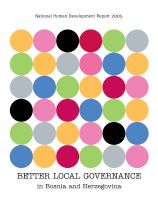
UNDP - HUMAN DEVELOPMENT REPORT 2005 - BOSNIA and HERZEGOVINA
instead of an abstract here, please refer to the Introduction PDF-file
More...We kindly inform you that, as long as the subject affiliation of our 300.000+ articles is in progress, you might get unsufficient or no results on your third level or second level search. In this case, please broaden your search criteria.

instead of an abstract here, please refer to the Introduction PDF-file
More...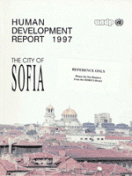
It is a real challenge to focus the National Human Development Report Bulgaria 1997 on problems of social inte-gration and cohesion in the current critical stage of the development of Bulgarian society. The country has to over-come the economic, political and cultural effects of protracted reforms carried out with high social costs. Difficult decisions are to be taken and implemented consequently. // Facing this extraordinary situation, a team of independent experts attempted to analyse the various dimensions of the disintegrating trends in Bulgarian society. As far as possible, prognostic visions are also aimed at in the Report. Moreover, the authors suggest a variety of solutions to problems which have to be dealt with immediately. They include pro-active measures for preventing excessive economic differentiation, long-term unemployment, corruption. Together with the strengthening of the state institutions, the initiative of individuals and groups is seen as a major force for mobilising resources to cope with the accumulated problems. // The ideas of the Report have been discussed in a series of open meetings. The authors could elaborate on their ar-guments taking numerous critical remarks and suggestions into account. Thus the team of authors headed by Prof. Nikolai Genov is much larger than indicated by the imprint. // The underlying idea of the proposals for action is that the future of the country is not predetermined. It should be created by the enlightened and responsible efforts of the Bulgarians. The international community will provide the necessary support. Our common aim is to establish the conditions for a sustainable human development in Bulgaria. This means to attain the highest possible level of well-being, of a free and dignified long life for all citizens and for future generations.
More...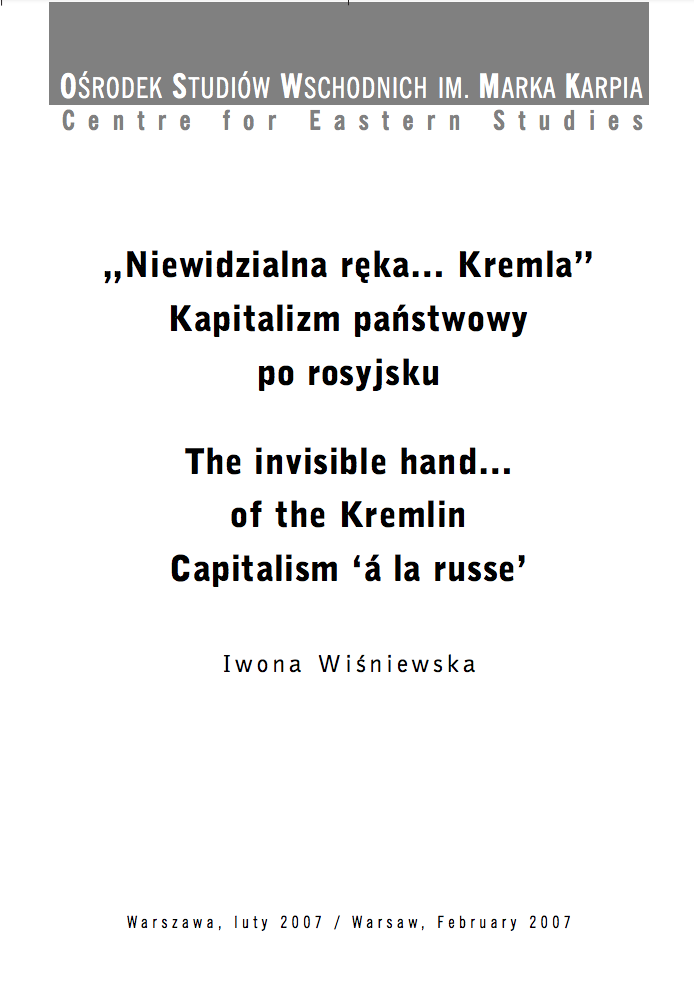
This study describes the two main economic processes observed in Russia during President Vladimir Putin's second term; renationalisation, and the concentration of economic assets.As a result of these processes, the share of state-owned property has increased and the position of the state in the economy has strengthened. According to the authorities, the wide-range renationalisation of the assets and the construction of superholdings based on the state enterprises are intended to boost Russia's potential and stimulate the development of the whole economy. However, in practice the current ruling elite are using these superholdings to strengthen Russia's position on the international arena and to promote their vested interests.
More...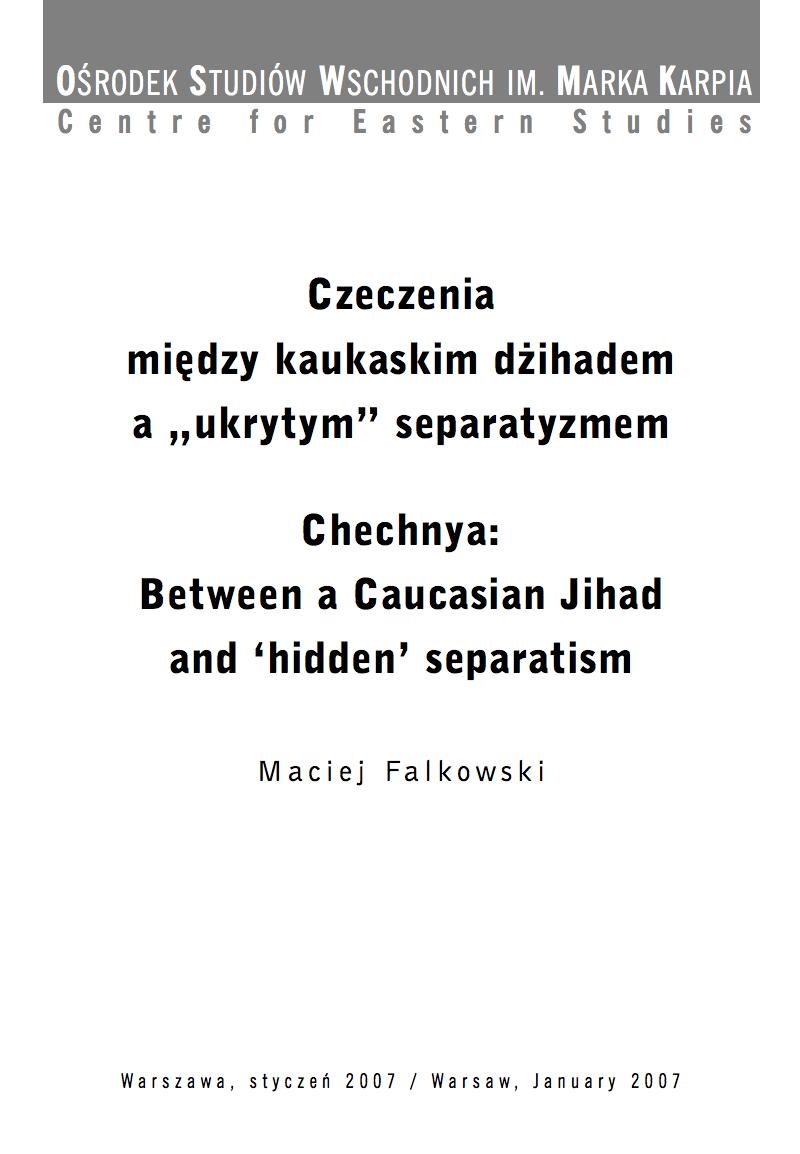
1. Even though Chechnya remains the most unstable republic in the Russian North Caucasus, the open armed conflict known as the Second Chechen War, which broke out in the autumn of 1999, is gradually dying down. The fighting has become less intensive every year, and the militants, worn out by years of warfare, are unable to take the initiative and seriously challenge the federal troops stationed in Chechnya. However, even if the militants have lost strength, this does not mean that the conflict is over. The region's history and the increasingly tense situation in the other Caucasian republics bordering Chechnya suggest that instability will probably continue for many more years.2. Several years ago, the conflict in Chechnya could have been characterised as a war between Chechen separatists and the government of the Russian Federation. However, the nature of the conflict has changed significantly over the last four or five years. At present, it is not only a Russian-Chechen conflict, but also an internal clash between the separatist militants and those Chechens who are co-operating with Moscow. The conflict also has an increasingly apparent social background. Finally, the militants' ideology has also changed: today they are fighting not so much for national liberation as for the Islamic cause.3. Even though the intensity of fighting in Chechnya has abated in recent years, the conflict has spilt over to the other Caucasus republics such as Ingushetia, Dagestan and Kabardino-Balkaria. As a result, this is presently not so much a Chechen conflict as a regional clash between the authorities and the Caucasian (including Chechen) Islamists. The latter seek to 'liberate' the entire North Caucasus and establish sharia law in the region. 354. The Chechen militants are weaker now, and the conflict has changed from a struggle for national liberation into a fight for the Islamic cause; but this does not mean that Russia has ultimately solved the problem of Chechen separatism. Today, it manifests itself not through armed struggle, but through demands for ever-wider autonomy within the Russian Federation ('hidden' separatism). Such demands have been raised by the formally pro-Russian government of Chechnya, led by Prime Minister Ramzan Kadyrov. The objective is to acquire real, rather than formal, independence from Moscow, especially in the economic sphere. An analysis of the current situation in the republic leads to the conclusion that this objective has already largely been achieved; today Chechnya in many areas remains outside the Russian legal system and enjoys extensive internal autonomy. 5. A renewed outbreak of the armed conflict in Chechnya seems unlikely in the immediate future, the main reason for this being that the Chechen people are tired of the long war. In the longer term, however, it appears inevitable that the Chechens will rise against Moscow again, fighting either for national liberation or for Islam. In the former case, the movement will be probably led by the current, formally pro-Russian government. However, it is also possible that by that time, the Caucasian Islamists will have gained enough strength to become the driving force behind a new, massive uprising against Russia, whose objective will be to create an Islamic state in the North Caucasus.
More...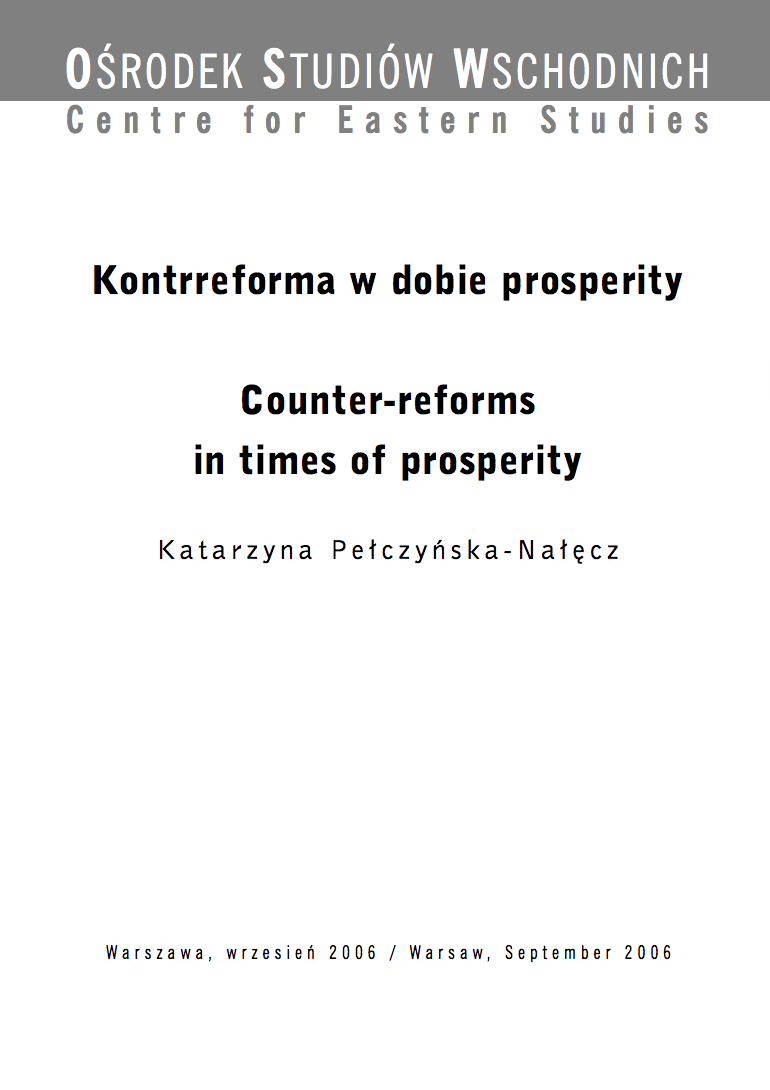
In 2000, Vladimir Putin came to power after nearly a decade of the rule of the first Russian president, Boris Yeltsin. As prime minister, and later as a candidate for president, Putin announced that he would reform the state. The main assumptions of this reform were presented during a congress of the pro-Kremlin Unity movement, in Putin's address entitled 'Russia at the turn of the millennium' which was delivered on 29 December 1999, and later in a open letter to voters published on 25 February 2000. Both declarations were rather general, but they gave a clear picture of the principal directions of and priority areas for the future president's efforts: they outlined Russia's development path as pro-market and democratic.Nearly seven years have passed since Vladimir Putin came to power, a time for a summary of his achievements. In a way, Vladimir Putin has partially delivered on his initial declarations; indeed, Russia has undergone a deep transformation. However, when seen in the light of the president’s initial promises, the changes appear to be no more than 'counter-reforms', because instead of putting into practice the policy he outlined seven years ago, they have largely followed a different, if not entirely opposite direction.
More...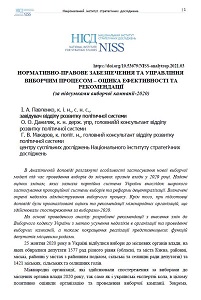
The Analytical Report considers the peculiarities of the application of the new electoral model during the elections to local authorities in 2020. Estimates are given of the changes that the party system of Ukraine has undergone due to the widespread use of the proportional system of elections and the decentralization reform. Some shortcomings of the election process administration have been identified. In addition, during the preparation of the report, the assessments and recommendations of international organizations that observed the 2020 elections were analyzed. Based on the analysis, recommendations were developed to amend the Electoral Code of Ukraine in order to eliminate shortcomings in the organization and conduct of election campaigns, as well as to improve the implementation of representative functions of deputies by local councils.
More...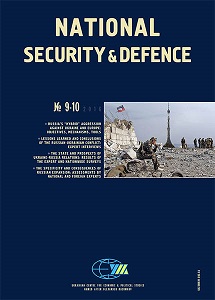
RUSSIA’S “HYBRID” WAR – CHALLENGE AND THREAT FOR EUROPE // European Dimension of Russia’s Aggression // Russia’s Hybrid Aggression: Ukrainian Foothold // RUSSIA’S “HYBRID” AGGRESSION: GOALS, CONSEQUENCES, COUNTERMEASURES // RUSSIA’S “HYBRID” AGGRESSION IN UKRAINE AND IN EUROPE: EXPERT OPINIONS AND ASSESSMENTS // THE RUSSIA-UKRAINE CONFLICT IN THE EYES OF CITIZENS // CHARACTERISTICS AND CONSEQUENCES OF RUSSIAN EXPANSION: EXPERT DIALOGUE // TOTAL WAR PUTIN-STYLE: RUSSIA’S “HYBRID” WAR AGAINST UKRAINE // “HYBRID” WORLD WAR IV (2014-2016). THE RISE AND FALL OF THE “RUSSIAN WORLD” // INFORMATIONAL-PSYCHOLOGICAL ASPECT OF A “HYBRID” WAR // FROM “RUSSIA’S GREATNESS” TO “GRAND EURASIA”: HYBRID WARAS A MECHANISM OF RUSSIA’S GEOPOLITICAL EXPANSION // MILITARY COMPONENT OF RUSSIA’S AGGRESSION // THE CHALLENGE OF “HYBRID WAR” // RUSSIA AND СENTRAL AND EASTERN EUROPE: BETWEEN CONFRONTATION AND COLLUSION // KREMLIN’S NETWORKS IN FRANCE
More...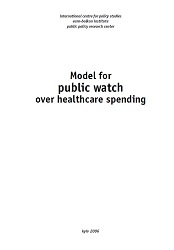
In Ukraine today, the environment for a dialog between the state and citizens on public control over public healthcare spending is almost entirely lacking. The reason for this is the absence of the necessary mechanisms, institutions, procedures and practices for public participation in the decision-making process within authorities. But extending democratic principles to healthcare is one way to improve publicpolicy in this area and raise the health of Ukrainian society in general. The development and institution of public control over public healthcare spending should be a reform priority. This, in turn, requires a set of clear, understandable and transparent rules and procedures. This manual presents a practical model for public control over public healthcare spending. The main requirements attached to this model are described in terms of legal and institutional arrangements for public control, the dissemination of information and the participation of NGOs in mobilizing the general public. Jointly prepared by specialists from the Euro-Balkan Institute (Macedonia), the Public Policy Research Center (Kazakhstan), and the International Centre for Policy Studies (Ukraine), the uniqueness of this publication lies in the fact that, during its preparation, public policy tools used in the European Union, Central Europe and Central Asia were examined.
More...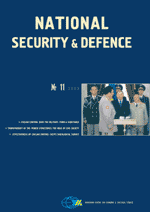
DEMOCRATIC CIVILIAN CONTROL OVER THE MILITARY IN UKRAINE: THE PATH FROM FORM TO SUBSTANCE // 1. DEMOCRATIC CIVILIAN CONTROL OVER THE MILITARY, ITS SUBSTANCE AND URGENCY FOR UKRAINE // 2. UKRAINE'S GAINS IN FORMING THE SYSTEM OF CIVILIAN CONTROL OVER THE MILITARY // 3. CIVILIAN CONTROL OVER THE MILITARY IN UKRAINE: CORRESPONDENCE TO THE EFFECTIVENESS CRITERIA // NGOs AS THE BASIS FOR CIVIL SOCIETY // CLOSED POWER STRUCTURES ARE DANGEROUS FOR SOCIETY // "90 PER CENT OF OUR SERVICEMEN ARE BUSY GUARDING THEMSELVES" // IT IS NECESSARY TO STRENGTHEN THE INFLUENCE OF CIVILIANS WITHIN POWER STRUCTURES // THE PROBLEMS OF SOCIAL PROTECTION OF SERVICEMEN // THE ARMY SHOULD SERVE THE NATION // ACTIVITIES OF THE INTERIOR MINISTRY ARE TRANSPARENT FOR SOCIETY // DEFENCE MINISTRY — FOR THE EFFECTIVE CO-OPERATION WITH MASS MEDIA // HARMONISATION OF THE RELATIONS BETWEEN THE MILITARY AND SOCIETY // THE GENERAL MILITARY INSPECTORATE WITHIN THE SYSTEM OF CIVILIAN CONTROL // CIVILIAN CONTROL IS EFFECTIVE AND ADEQUATE // THE ACTIVITIES OF POWER STRUCTURES SHOULD BE TRANSPARENT FOR SOCIETY // BORDER GUARDS — FOR THE CO-OPERATION WITH PUBLIC // TRULY DEMOCRATIC CIVILIAN CONTROL OVER THE MILITARY BARELY EMERGES IN UKRAINE // CIVILIAN CONTROL OVER THE MILITARY IS AN IMPERATIVE OF THE MOMENT
More...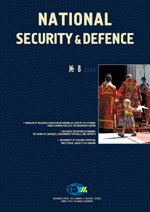
WHAT UKRAINIANS THINK ABOUT RELIGIOUS EDUCATION // RELIGIOUS EDUCATION IN UKRAINE: PROBLEMS AND SOLUTIONS // ONE SHOULD NOT DELAY THE INTRODUCTION OF RELIGIOUS EDUCATION IN A POST'ATHEISTIC SOCIETY / TODAY SECONDARY SCHOOL DOES NOT MEET SOCIETY’S REQUIREMENTS // WE SHOULD SEEK TO FORGE A NATIONWIDE CONSENSUS ON MORAL BEHAVIOUR // WE ALL KNOW HOW TO DO IT AND ARE CAPABLE OF DOING IT, BUT THERE IS NO GOOD WILL // FORMATION OF SPIRITUALITY, MORALITY, AND OUTLOOKS IS A PROBLEM THAT WE SHOULD RESOLVE TOGETHER // ARTICLE 11 OF THE CONSTITUTION OBLIGES THE STATE TO REVIVE TRADITIONAL RELIGIOUS MORALITY // OFFERING MORALITY WITHOUT GOD MAKES NO SENSE // A SPIRITUAL SUBJECT MUST BE MANDATORY IN EACH SCHOOL // CHURCHES SHOULD ACT TOGETHER AND HAVE COMMON VALUES // MOST IMPORTANT PROBLEM IS WHAT SHOULD BE TAUGHT IN SECONDARY SCHOOL // WE MUST WORK SIDE BY SIDE IN INTRODUCING SPIRITUAL EDUCATION
More...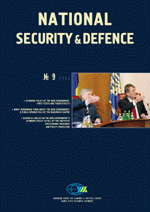
THE NEW GOVERNMENT’S ECONOMIC POLICY: FIRST STEPS AND THEIR EFFECTS // SECTION 1. ECONOMIC POLICIES OF THE NEW GOVERNMENT: GAINS AND MISCALCULATIONS // SECTION 2. THE NEW GOVERNMENT’S SOCIAL POLICY: MIXED RESULTS // SECTION 3.THE DYNAMICS OF PUBLIC ASSESSMENTS AND EXPECTATIONS OF THE NEW GOVERNMENT // FULFILLMENT OF PRESIDENT YUSHCHENKO’S ELECTORAL COMMITMENTS // CONCLUSIONS AND RECOMMENDATIONS // AFTER A HOLIDAY: THE STATE OF ACCOUNTS
More...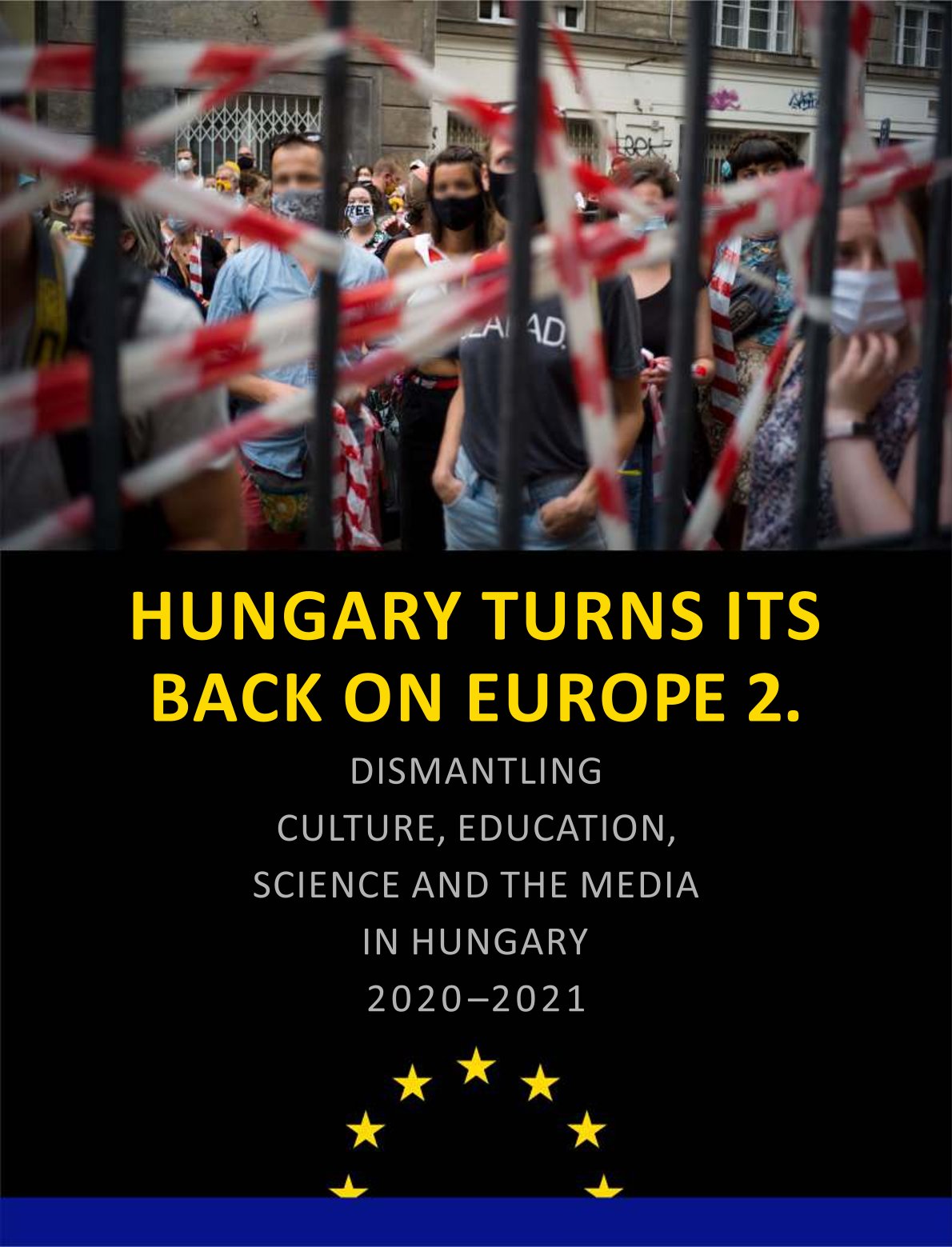
With this volume, we continue our "Hungary turns its back on Europe" report, which was finalised in autumn 2019 and published in January 2020, "prepared by independent Hungarian intellectuals who wish to inform the Hungarian and international public as well as European institutions about the severe harm that the Orbán regime governing Hungary since 2010 has caused in the fields of education, science, culture, and the media." The reason for carrying on with our work is that, in the meanme, the situation in Hungary has exacerbated: the authoritarian features of the Orbán regime have been further strengthened, dismantling of the rule of law has continued, and the government's "cultural warfare" has moved up a gear and is increasingly destructive in the domain of culture. It is our common experience that Hungary, using European Union funds, has built an openly anti‐European, 21st century autocracy, which has taken the state captive, dismantled the checks and balances essential to the rule of law, turned democratic institutions into an empty shell, invaded the media and made corruption systemic.
More...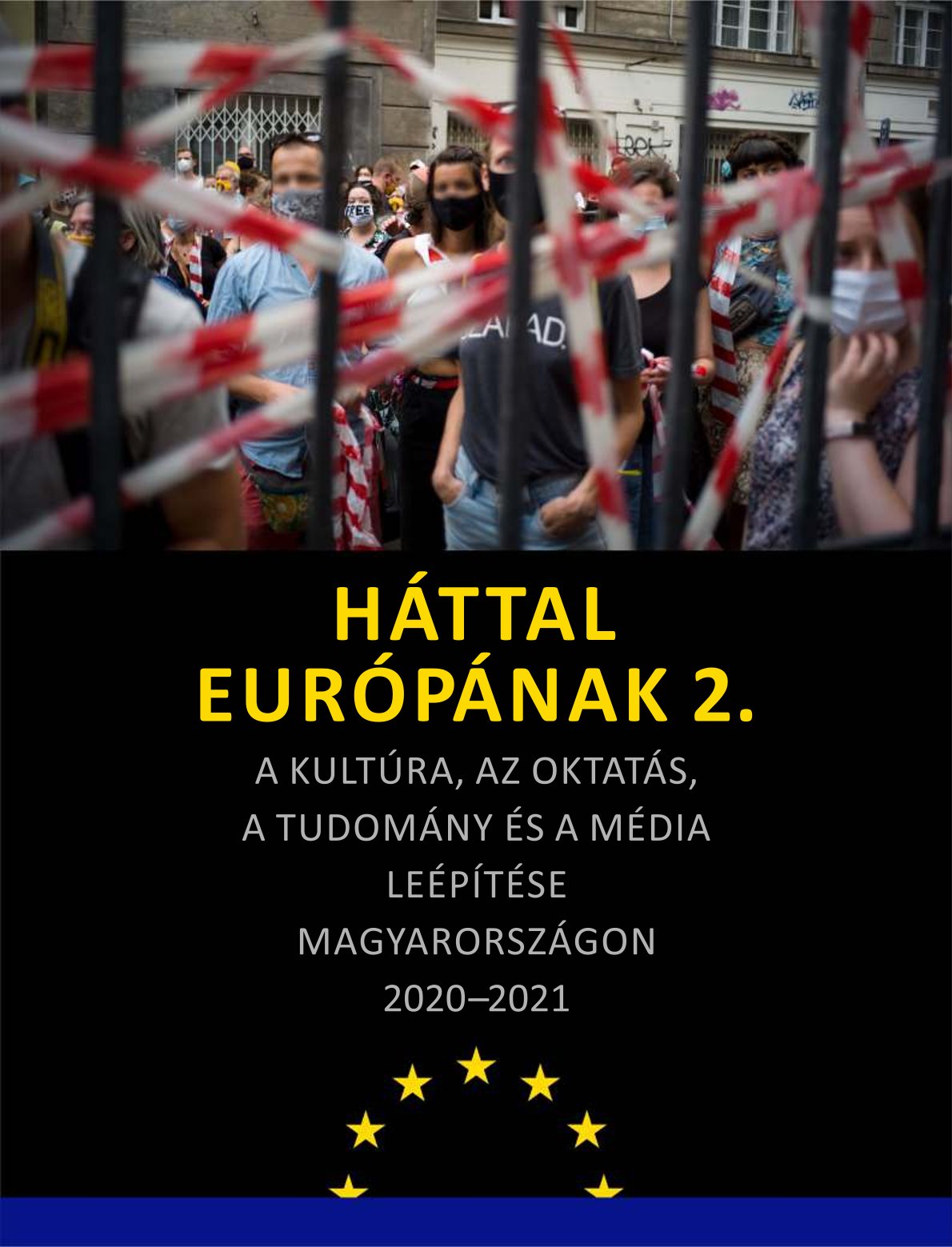
With this volume, we continue our "Hungary turns its back on Europe" report, which was finalised in autumn 2019 and published in January 2020, "prepared by independent Hungarian intellectuals who wish to inform the Hungarian and international public as well as European institutions about the severe harm that the Orbán regime governing Hungary since 2010 has caused in the fields of education, science, culture, and the media." The reason for carrying on with our work is that, in the meantime, the situation in Hungary has exacerbated: the authoritarian features of the Orbán regime have been further strengthened, dismantling of the rule of law has continued, and the government's "cultural warfare" has moved up a gear and is increasingly destructive in the domain of culture. It is our common experience that Hungary, using European Union funds, has built an openly anti‐European, 21st century autocracy, which has taken the state captive, dismantled the checks and balances essential to the rule of law, turned democratic institutions into an empty shell, invaded the media and made corruption systemic.
More...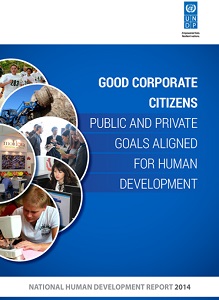
The 2014 National Human Development Report clearly shows that the role of the private sector in generating human development transcends that of a tax-payer and a creator of jobs, important though these contributions are. The report presents a thoroughly documented review of global and national experience to demonstrate how the private sector can play the role of catalyst for change by promoting new approaches, technologies, services and policy proposals. We trust these examples will inspire all of the many actors who have a part to play in this and help to drive further the efforts of the Moldovan business community to advance the modernization of the country. // The sustainable and inclusive development of Moldova in a way which benefits all people will occur only if Government, the private sector and society at large join efforts to achieve this goal. The 2014 report seeks to identify what can drive the private sector’s contributions to economic and social progress, what the obstacles are, and how an ecosystem conducive for stronger private–public development engagement can be attained. It provides a set of well-defined policy recommendations for all national actors, including central government and private companies, which we hope will continue the discussions started in the process of formulating the report.
More...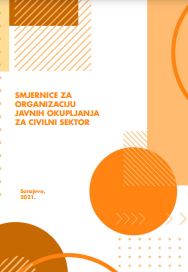
Cilj priručnika je da aktivistima_kinjama i potencijalnim organizatorima_cama mirnih okupljanja približi politički, pravni i institucionalni kontekst u kojem se prakticira pravo na slobodu mirnog okupljanja u Bosni i Hercegovini. Odgovori su poredani po pitanjima, te su laicizirani kada govore o pravnim institutima i rješenjima, a sve kako bi bili bliži aktivistima_kinjama različitih provenijencija. Pravo na slobodu mirnog okupljanja je predmet mnogobrojnih rasprava i sporenja, ne samo u našoj zemlji, već i šire. Odgovori dani u priručniku temelje se na pravnim propisima koji su trenutno na snazi. Namjera je bila sažeti različita rješenja u jedan odgovor – kako bi suština bila objašnjenja aktivistima_kinjama, ili kako bi bili dani neki praktični savjeti, naročito u pogledu održavanja javnog reda i mira, kao i tereta odgovornosti koji je tu stavljen na aktiviste_kinje i organizatore_ice mirnih okupljanja. Na pojedinim mjestima objašnjeni su i međunarodni standardi. Međutim, priručnik nije koncipiran kao analiza ili izvješće, stoga su navedene samo najznačajnije praske i poruke. Cilj je bio dati odgovore, savjete i praktična rješenja koja su po mogućnosti od pomoći u trenutnom ambijentu u kojem se vrlo često guše temeljna ljudska prava i slobode.
More...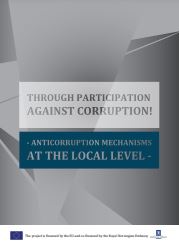
Corruption in local self-government is in direct correlation with the weaknesses of administration, from organizational to technical, managerial and human resources. Municipalities have a monopoly position in relation to providing of certain services, which represents a suitable frame for acts of corruption. Opportunities for corruption at the local level are broad, since almost all of the employees – from the ones occupying the lowest positions to the highest level of authority have direct contact with the beneficiaries. The most common forms of corruption in local self-governments are connected to exemption from paying of utility bills and taxes, financing of projects, works or services which should not be supported, or the provided support is much higher than is actually needed. Acts of corruption could also be linked to non-transparent recruitment in local self-government bodies or public institutions founded by the municipality; selling or leasing municipal land, procurement of goods or services conducted contrary to established rules or public procurement procedures, etc.
More...
Projekat „Monitoring poštovanja ljudskih prava u ustanovama zatvorenog tipa u Crnoj Gori“, čiji je cilj unapređenje ljudskih prava osoba smještenih u ove ustanove, izvele su nevladine organizacije iz Crne Gore „Akcija za ljudska prava“ (HRA), kao nosilac projekta, Centar za antidiskriminaciju „EKVISTA“, Centar za građansko obrazovanje (CGO) i Sigurna ženska kuća (SŽK), uz pomoć Beogradskog centra za ljudska prava i Letonskog centra za ljudska prava, a finansirale Evropska unija posredstvom Delegacije Evropske unije u Crnoj Gori i Ambasada Savezne Republike Njemačke. Projekat je izveden u periodu od 1. marta 2010. do 31. marta 2013. U okviru projekta, 17. juna 2011. zaključen je Sporazum o saradnji između nosioca projekta NVO „Akcija za ljudska prava“, Ministarstva rada i socijalnog staranja i Javne ustanove (JU) Zavod „Komanski most“ za smještaj osoba s intelektualnim invaliditetom, koji je obuhvatio: nenajavljene posjete monitora nevladinih organizacija ovoj ustanovi; predstavljanje izvještaja o posjetama i razgovor o izvještajima na okruglom stolu; izradu brošure o pravima korisnika ustanove i saradnju na javnoj kampanji, čiji je cilj približavanje potreba i prava korisnika široj javnosti. Izvještaj u nastavku sadrži ukupnu ocjenu monitoring tima pomenutih nevladinih organizacija iz Crne Gore o stepenu primjene preporuka za unapređenje poštovanja prava korisnika Zavoda „Komanski most“ (u daljem tekstu „Zavod“) koje su dali Evropski komitet za sprječavanje mučenja i nečovječnog ili ponižavajućeg postupanja ili kažnjavanja (CPT) i Zaštitnik ljudskih prava i sloboda, kao i dodatnih preporuka nevladinih organizacija koje su učestvovale u ovom projektu. Izvještaj je izrađen na način koji omogućava praćenje napretka koji je postignut od početka monitoringa u julu 2011. do objavljivanja prvog izvještaja u novembru 2011., odnosno završnog izvještaja koji je objavljen u februaru 2013. Na kraju svakog poglavlja dodali smo upućivanja na tabelu, koja pokazuje šta je unaprijeđeno u određenoj oblasti. Na kraju izvještaja, u vidu dodatka, objavljujemo tabelarni prikaz primjene preporuka prilikom objavljivanja završnog izvještaja u februaru 2013. godine, odnosno do kraja marta 2013.
More...
Izvještaj je nastao u okviru projekta „Monitoring poštovanja ljudskih prava u institucijama zatvorenog tipa u Crnoj Gori“, koji su Akcija za ljudska prava, nosilac projekta, i partnerske organizacije: Centar za građansko obrazovanje, Centar za antidiskriminaciju „EKVISTA“, Sigurna ženska kuća, Beogradski centar za ljudska prava i Letonski centar za ljudska prava, sprovodile od 1. marta 2011. do kraja marta 2013. godine. Osnovni cilj projekta bio je da unaprijedi zaštitu od mučenja, nečovječnog i ponižavajućeg postupanja ili kažnjavanja u Crnoj Gori i pomogne efikasno sprovođenje preporuka međunarodnih stručnih tijela, Komiteta protiv mučenja - CAT i Evropskog komiteta za sprječavanje mučenja – CPT za Crnu Goru. Cilj projekta je i podrška kontrolnoj funkciji Zaštitnika ljudskih prava i sloboda (nacionalni mehanizam za spriječavanje mučenja) i Skupštine Crne Gore u opštoj zaštiti od mučenja i drugog zlostavljanja, i posebno, poštovanju prava rezidenata ustanova zatvorenog tipa. U okviru projekta obezbijeđene su i dvije publikacije za sve državne tužioce i nadležne sudije, odnosno državna tužilaštva i nadležne sudove u Crnoj Gori: „Sprečavanje i kažnjavanje mučenja i drugih oblika zlostavljanja – priručnik za sudije i tužioce“, Radmila Dragičević-Dičić, dr Ivan Janković, Beogradski centar za ljudska prava, Beograd, 2011. i „Zabrana mučenja, nečovječnog ili ponižavajućeg postupanja ili kažnjavanja - zbirka presuda Evropskog suda za ljudska prava“, ur. Žarko Marković, Akcija za ljudska prava, Podgorica, 2013. Izvještaj je napisao advokat Luka Stijepović, u saradnji sa Teom Gorjanc-Prelević i Mirjanom Radović iz Akcije za ljudska prava. Advokatica Daliborka Knežević, ispred Centra za antidiskriminaciju „EKVISTA“, priredila je analize slučajeva Nenada Ivezića, Miljana Despotovića i JU Zavoda „Komanski most“. Urednica izvještaja je Tea Gorjanc-Prelević, izvršna direktorka Akcije za ljudska prava. Posebno se zahvaljujemo na saradnji predsjednicima svih osnovnih sudova u Crnoj Gori, Slavici Stijović, sekretarki Osnovnog suda u Podgorici, Zorici Dabanović, upraviteljki sudske pisarnice Osnovnog suda u Baru, Zdravku Rajeviću, savjetniku u Osnovnom sudu u Beranama, advokatima: Daliboru Kavariću, Azri Jasavić, Borislavu Vlaoviću i Vladimiru Vulekoviću, kao i Siniši Dabanoviću, Aleksadru Saši Zekoviću i Rašku Dendiću.
More...
Projekat „Monitoring poštovanja ljudskih prava u ustanovama zatvorenog tipa u Crnoj Gori“, u cilju unaprijeđenja poštovanja ljudskih prava osoba smještenih u ove ustanove, izvele su od marta 2011. do kraja marta 2013. nevladine organizacije „Akcija za ljudska prava“ (HRA), kao nosilac projekta, Centar za antidiskriminaciju „EKVISTA“, Centar za građansko obrazovanje (CGO) i Sigurna ženska kuća (SŽK), u saradnji sa Beogradskim centrom za ljudska prava i Letonskim centrom za ljudska prava. Projekat su finansirale Evropska unija posredstvom Delegacije Evropske unije u Crnoj Gori i Ambasada Savezne Republike Njemačke u Podgorici. U okviru projekta, 25. oktobra 2011., zaključen je Sporazum o saradnji između nosioca projekta NVO „Akcija za ljudska prava“, Ministarstva pravde i Zavoda za izvršenje krivičnih sankcija (ZIKS), koji je omogućio posjete tima monitora navedenih nevladinih organizacija objektima ZIKS-a (zatvorima) u Podgorici i Bijelom Polju, uz prethodnu najavu od 24 časa, pristup medicinskoj i dokumentaciji vezanoj za disciplinske postupke pritvorenih i osuđenih lica, predstavljanje izvještaja o posjetama i razgovor o izvještaju na okruglom stolu, izradu priručnika o pravima pritvorenih i osuđenih lica i saradnju na javnoj kampanji čiji je cilj približavanje prava pritvorenih i osuđenih lica široj javnosti. Neposredni cilj monitoringa je bio izrada izvještaja o usvajanju preporuka iz Izvještaja Vladi Crne Gore o posjeti Crnoj Gori Evropskog komiteta za sprječavanje mučenja i nečovječnog ili ponižavajućeg postupanja ili kažnjavanja (CPT) od 15. do 22. septembra 2008. godine (u nastavku: „CPT, Izvještaj o posjeti 2008“) i preporuka Zaštitnika ljudskih prava i sloboda Crne Gore (Ombudsmana). Izvještaj je objavljen na okruglom stolu 21. juna 2012. godine u prisustvu predstavnika uprave ZIKS-a, ministra pravde i predstavnika Delegacije EU. Pored ocjene primjene preporuka CPT-a i Ombudsmana, NVO monitoring tim je dao ukupno 164 preporuke za unaprijeđenje poštovanja ljudskih prava u zatvorima u skladu s međunarodnim standardima i preporukama. Neke od preporuka bile su i ponovljene preporuke CPT-a i Ombudsmana. Na kraju projekta, 27. marta 2013. godine, predstavljene su završne ocjene NVO monitoring tima o primjeni preporuka, uz učešće predstavnika uprave zatvora, pomoćnice ministra pravde na čelu Direktorata za izvršenje krivičnih sankcija Ministarstva pravde i šefa Delegacije EU u Crnoj Gori. U ovoj publikaciji objavljujemo izvještaj iz juna 2012. godine („Izvještaj o poštovanju prava pritvorenih i osuđenih lica u Zavodu za izvršenje krivičnih sankcija“) sa tabelom koja sadrži 164 preporuke i ocjenu njihove primjene do kraja projekta u martu 2013. godine. Sastavni dio izvještaja su i rezultati istraživanja među osuđenicima „Poštovanje ljudskih prava u Zavodu za izvršenje krivičnih sankcija – stavovi osuđenika“ iz marta i aprila 2012. godine. U okviru projekta je izrađena i brošura o osnovnim pravima za zatvorenike i zatvorenice na crnogorskom, engleskom i albanskom jeziku, kao i kratki dokumentarni film. Upravi zatvora su dostavljene i knjige „Sprječavanje zlostavljanja i mučenja – priručnik za policiju i zatvorsko osoblje“, dr Ivana Jankovića i Radmile Dragičević-Dičić, koji je izdao Beogradski centar za ljudska prava 2011. godine, kao i publikacija „Zabrana mučenja i drugog zlostavljanja – zbirka izabranih presuda Evropskog suda za ljudska prava“, urednika Žarka Markovića, izdanje Akcije za ljudska prava, 2013. godine. Saradnja sa Ministarstvom pravde i upravom ZIKS-a na ovom projektu je bila izuzetna i predstavlja primjer konstruktivne saradnje državnih organa sa nevladinim organizacijama. Rezultati ovog projekta su zajednički. Na strpljenju i vremenu koje su posvetili projektu posebno zahvaljujemo Dušku Markoviću, ministru pravde i ljudskih prava i potpredsjedniku Vlade Crne Gore, Slavici Rabrenović, pomoćnici ministra pravde na čelu Direktorata za izvršenje krivičnih sankcija Ministarstva pravde, Miljanu Peroviću, direktoru ZIKS-a, Milanu Tomiću, pomoćniku direktora ZIKS-a, Urošu Bogavcu, načelniku KPD-a u prvoj fazi projekta, Milanu Radoviću, načelniku KPD-a u drugoj fazi projekta, Katarini Mitrović, načelnici zatvora za kratke kazne, Branislavu Petroviću, načelniku zdravstvene službe, Radoslavu Sekuloviću i Željku Redžiću, rukovodiocima službe obezbjeđenja, Žani Asanović, sekretarici direktora ZIKS, Anki Cerović, iz pravne službe ZIKS-a i Mušiki Dujoviću, predsjedniku Višeg suda u Podgorici. Hvala na povjerenju svim službenicima ZIKS-a koji su razgovarali sa nama i posebno svima koji su učestvovali u našoj anketi o stavovima osuđenika. Na podršci zahvaljujemo i Delegaciji Evropske komisije u Crnoj Gori, posebno Mitji Drobniču, šefu Delegacije, Albertu Kamarati, šefu sektora za politiku, evropske integracije i privredu i Jadranki Milić, zaduženoj za nadzor nad ovim projektom, kao i Ambasadi Savezne Republike Njemačke, posebno Veri Bordfeld, zamjenici ambasadora i Smilji Goli.
More...
This research article is structured so as to demonstrate the political-cultural-ideological roles of US foundations at home and abroad during the Cold War, with special reference to promoting their concept of Americanism and combating dissenting forces. First, the article briefly examines the concept of “anti-Americanism”, which is central to the project of which this article is a small part; secondly, it provides an introduction to the origins, aims and world-view of the foundations and their broad ideas and definitions of “Americanism” and “anti-Americanism”, both controversial concepts subject to great debate within the United States particularly in the ideologically-charged atmosphere of the twentieth century; thirdly, it considers the foundations’ social composition; fourthly, the paper considers the numerous and varied activities of the foundations in selling “Americanism” and combating “anti-Americanism”, inside and outside the USA. Finally, the paper closes with a discussion of the purposes of “anti-Americanism” in the life of the foundations and how those purposes and activities may best be theoretically understood.
More...